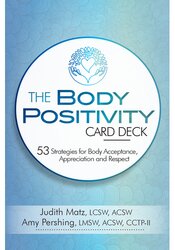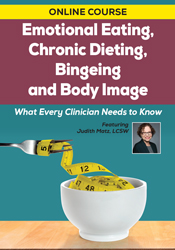Working with Eating Concerns in the Time of Corona
How therapists can help clients avoid self-judgment at this time.

Many clients are currently expressing heightened concerns about food, eating and weight. Anxiety about going to the grocery store means that people are stocking up on large amounts of food, if theyÔÇÖre in a position to do so. Clients may also find that theyÔÇÖre turning to food to regulate the wide range of emotions triggered by this pandemic. Given this combination of having more food in our cupboards, less opportunity for physical activity, and more reasons for emotional overeating, clients may experience increased worry about weight gain.
To make matters more challenging, there are many memes going around social media about gaining weight during Covid-19. While humour is a helpful way to deal with this stressful time, fat shaming jokes just arenÔÇÖt funny. They perpetuate weight stigma and hurt people who are already dealing with body image and eating struggles.
The importance of self-compassion is the most crucial message to communicate to clients as they manage their responses to the virus. For example, explain that during times of distress, itÔÇÖs understandable that they may turn to food as a way to soothe. Rather than judging themselves, help clients keep in mind that eating is not a moral issue, and they are not ÔÇÿbadÔÇÖ for doing so. At the same time, if eating is their primary coping strategy, help clients to consider other ways to soothe, comfort or even distract themselves. In addition to exploring their feelings in therapy, activities such as colouring books, puzzles, crafts, and Netflix shows are examples of how people are getting themselves through this challenging time while at home.
Clients can support their immune systems by considering which foods provide them with nutrients and taste good. Depending on circumstances, clients can do their best to keep these foods available; for example, if clients shop every two weeks, they might purchase frozen fruits and vegetables to have available when fresh produce runs out. Some clients report that itÔÇÖs calming to decide how often they will go to the grocery store so they donÔÇÖt feel anxious about running out of food, e.g. once every 10 days.
Many people are turning to diet plans and supplements to prevent weight gain while sheltering at home. Unfortunately, the deprivation that comes from restricting food is actually a set up for overeating. Diets do not work, and they will not work during a pandemic. Furthermore, dieting for weight loss can actually weaken the immune system. Encourage your clients to honour their signals for hunger and fullness as much as possible, as they choose from a wide variety of all types of food. This approach to eating, known as attuned or intuitive eating, supports people in developing a healthy relationship with food. In fact, many clients who already practice intuitive eating notice that they are not experiencing an increase in overeating.
Your clientsÔÇÖ weights may or may not change during this pandemic. For some people, it may feel safer to focus on weight concerns rather than the fear of getting sick. For others, body image concerns are an ongoing source of distress. Keep in mind that weight is a characteristic, not a behaviour, and help your clients explore the following questions about positive, sustainable behaviours that can support their bodies during Covid-19:
- Does their body want to move? If so, when and how much? Do their prefer to get outdoors? Have they identified any online offerings to support moving their bodies?
- Do they notice themselves getting more tired? Can they honour their bodyÔÇÖs need to slow down, even if it seems they shouldnÔÇÖt need to? Resting isnÔÇÖt ÔÇÿdoing nothingÔÇÖ.
- What kinds of foods feel nourishing right now? Are they interested in experimenting with new recipes? Does takeout feel good sometimes? Is it easier to microwave frozen foods?
- Are they using video gatherings or phone calls to help themselves stay in touch with family, friends or colleagues? It would be more accurate to say that we need to practice physical distancing while maintaining social connection.
- Do they use mindfulness or meditation practices to help calm the nervous system? During this period of increased stress, do they want to explore this option if they havenÔÇÖt done so before?
***
Judith Matz is co-author of the new Body Positivity Card Deck: 53 Strategies for Body Acceptance, Appreciation and Respect
This blog is originally publishing on
***

With these simple practices, reflections, and inspirations youÔÇÖll learn to find appreciation for your body. This deck contains 53 unique healing strategies that will guide you to build self-confidence and respect for the body that you have - and help to create a more inclusive world.

This groundbreaking gives you cutting-edge, research-based information on disordered eating and diet culture
Through educational programs, she is dedicated to helping people end the preoccupation with food and weight. Judith received her MSW at University of Michigan and earned her post-graduate certificate at Michael Reese Hospital in Chicago, where she trained in the treatment of eating disorders.
Learn more about their educational products, including upcoming live seminars, by clicking here.
Topic: Diet and Nutrition
Tags: Anxiety | Binge eating | Body | Body weight | Depression | Diet and nutrition | Emotional/Impulse Control | Nutrition | Safe Practice | Self-Esteem | Strategies | Therapy Tools



